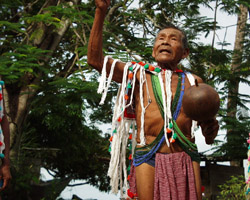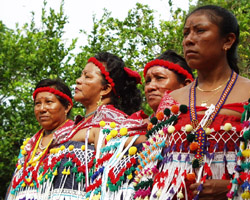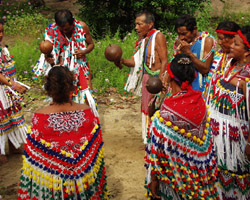| The Voice of the Kari'na
- The Caribs of Galibi
Yesterday evening we
returned back from Babun Santi Beach to Galibi, the small Carib village
that sits at the mouth of the Marowijne estuary. We met with Captain
Ramases and showed him our project asking him to participate. We were
aware from the beginning that in this village we were dealing with more
sophisticated participants than we have met so far on our journeys.
As I will explain later this village is unique in Suriname in many ways
and the level of education is far higher here than elsewhere. We made
our now polished pitch, showing him our diary entries from Kwamalasamutu,
Kawemhakan and Dritibikki, and invited him to participate by taking
advantage of an opportunity to send a message to the world. He liked
the work we showed him and agreed to take part ... the transcript of
his short message is at the bottom of this page. In fact he liked the
work so much that later in the evening Reggie Sliygngaard came to visit
us. He told us that both Captain Ramases and Captain Pane would talk
to us, and that the village appreciated our efforts for the indigenous
and tribal communities of Suriname so much that they wanted to put on
a show for us today. They had approached the Shaman of the village through
his mother (the shaman is 86 years old!) to see if it would be possible
for him to lead the Marakka dance, which they stressed is only performed
for the initiation of a new Shaman. We went to sleep in the warm glow
of their appreciation.
There are two organisations in Suriname that represent the rights of
the indigenous and tribal peoples here. One is the OIS which represents
the Amerindian peoples, the other is VIDS, or the Organisation of Village
Leaders, which represents the interests of all the peoples of the interior.
That this is not an ordinary Surinamese village is perhaps best illustrated
by the fact that Captain Ramases is the Head of OIS, while Captain Pane
is Chairman of VIDS. Its hard to express how much their approval means
to us after the journey we have just undertaken through the myriad different
cultures of this country.
After a wonderful sleep I awoke at the first cock's crow (you might
have heard a lot of them on our videos!). I was determined to video
the dawn, and I wasn't disappointed. Dawn is such a blissful time in
a fishing village as the boats head out to sea for the day, carving
their way steadily through the water, ablaze with the first rays of
the sun. Too soon the sun was high in the sky and in no time it was
covered by rain-filled clouds which dumped on the village till mid-afternoon.
We were able to spend three hours interviewing the captains about the
village, about what makes it so unique and about their work with the
conservation of the nearby Sea Turtles. Throughout our trip, from Semoise
right at the beginning, to Kwamalasamutu in the deep south of Suriname
we have heard rumblings of discontent with the traditional hereditary
leaders of communities. At times it has been hard to disagree with these
feelings but as outsiders it has been equally hard to criticise centuries
of tradition. The discontent has been especially strong in places where
the 'modern' world is beginning to tease apart the threads of an age-old
social fabric. Galibi is leading the way in finding a solution to this
thorny problem. Like so many things in this country it all began in
the "Interior War" of 1987. The Captains were away for long periods
and the young people formed a youth organisation to keep things running
smoothly. Pane and Ramases were two of these young men. After the conflict
ended they had gained a lot of respect amongst the people of the village.
The villagers here are amazingly in touch with the outside world. They
will quite easily chat about feminism and gender issues and the importance
of cultural identity. They seem to scan international trends and grab
onto ideas that they recognise as important new elements, and then incorporate
them into the world of the village. So perhaps it is not surprising
that they were also well aware of the concept of Democracy. As things
stood it would have been quite easy for them to do more damage than
good with this idea. Just look at Oliver Cromwell or the French Revolution.
What is particularly beautiful about what has been achieved here is
that these young leaders slowly succeeded in bringing the whole village
- including the old captains - round to the idea. Ten years later and
three years ago they finally won the debate and were elected leaders
of the community, which they set about re-arranging along radically
new lines. The best illustration of this was the diagram that they showed
us of the present structure of the village. At the top of the tree sits
"The People", below them the Captains. It would be hard to imagine some
of the captains and Granmen that we have visited visualising their social
worlds in this order! The new order is constructed out of a whole range
of village organisations and positions, all of which are beavering away,
applying for money from different international aid and development
organisations. A trading organisation takes produce from the whole village
and, taking advantage of the proximity of French Guyana, sells local
produce in neighbouring France. A women's group has flourished and owns
the two biggest boats in the village which it rents out to the men.
A village radio station has been set up to make sure that new developments
are communicated to the whole village. As the highly intelligent Captain
Pane stressed "The hardest but most important thing is to keep the whole
village informed and involved".
How to change to meet the demands of a changing world, while keeping
a grip on your traditional values? Here they have set up organisations
to maintain culture. There is one that monitors the fine details of
social protocol and Reggie Slijgngaard, the head of this organisation,
was the man who knew the protocol to ask the Shaman's mother to ask
the shaman to perform the ceremony that we saw this afternoon. There
is a man whose sole task it is to monitor the Kari'na language, to create
dictionaries and record usage. There is a computer in the radio room
into which all the cultural details of Kari'na culture are being loaded.
What is ironic is that of all the 'traditional' villages we have been
to, the traditions here seem to be the most cherished. It is truly remarkable
what has been achieved and it hasn't gone un-noticed in this country.
The leaders are in demand all over Suriname to lead workshops on how
things work in Galibi. Nearby the villages of Bigiston, Tapuku and Erowarte
have themselves followed the Galibi example. From what I have seen,
this approach would work well throughout the interior. Typically careful,
Captian Pane stresses that he never tells people how to live their lives,
but is happy to explain the way things changed here. To me the whole
thing is epitomised by Pane's response to Saramacca captains who want
to change the system in their country and depose their Granman. He tells
them that they have to work on the Granman, persuade him slowly, and
take the years that Pane himself took to make sure the Granman and all
the people understand and go along with the new order.
Even better, the Galibi villagers have set up an organisation called
STIDUNAL to liase with, and aid, STINASU and Biotopic with their work
in the conservation of Sea Turtles and the development of eco-tourism.
This too has been a long road travelled. In 1969 STINASU established
a nature reserve on the beaches from which the Kari'na traditionally
used to harvest eggs. They did this without even consulting the people
of Galibi, and not surprisingly raised considerable local opposition.
The tide finally turned though the work of Henk Reigaard and his wife
Judy who apparently worked tirelessly trying to make STINASU see the
importance of involving the Kari'na, and convincing the Kari'na that
the Turtles were worth more to the village alive than dead. STINASU
set up the eco-tourism lodge on Babun Santi where they now employ villagers
to look after tourists, and they also signed a paper granting the people
of Galibi the hunting and fishing rights in their traditionally held
territory. Two years ago there was a big party to mark the opening of
the lodge and it seems things are now improving with Turtle numbers
rising steadily according to STIDUNAL.
So it felt like there was something to celebrate as we made our way
to the Marakka dance. The Shaman did not disappoint, appearing with
his two apprentices and the dancers dressed in the bright colours of
traditional Carib dress. I have often wondered what happened to the
indigenous culture of the Caribbean. I feel incredibly lucky to have
been here to Galibi to find out. Even luckier to have seen the Marakka
dance and heard the music of the Karin ... a rhythm that can only have
originated from the lapping of the waves on the shore or slapping gently
the side of a fishing boat. Today's video shows this dance and a message
from Captain Ramases. It is a pleasure that this message is not a desperate
cry for help. These people have helped themselves. They have also helped
to safeguard the Sea Turtles that come here to nest. All this, however,
remains a fragile achievement while the Kari'na, like all the tribal
and indigenous peoples of Suriname, have no legally binding rights to
their ancestral lands. They have earned the support they request ...
and, over the last two days, our deepest respect.
The Voice of the Kari'na - The Caribs of Galibi
Our development in Galibi depends on 2 important factors: 1. Security:
We would like to see our landrights problems solved. We are asking the
government to acknowledge our landrights. We also ask all international
organisations and donors to give support to all our activities in getting
these landrights so that our government will accept our landrights."
`
2. We depend on economic activities to make a living in our village.
We do not want to depend on the Government for that. Therefore we are
working on a lot of projects, economic projects. We ask the donors to
support us in this and to consider funding these projects when we apply
to them.
|


The Water Ablaze...

Captains Pane and Ramases
- The New ViIlage Order

Kari'na Shaman

The Shaman's Dancers

Waves on the Shore ...
|










